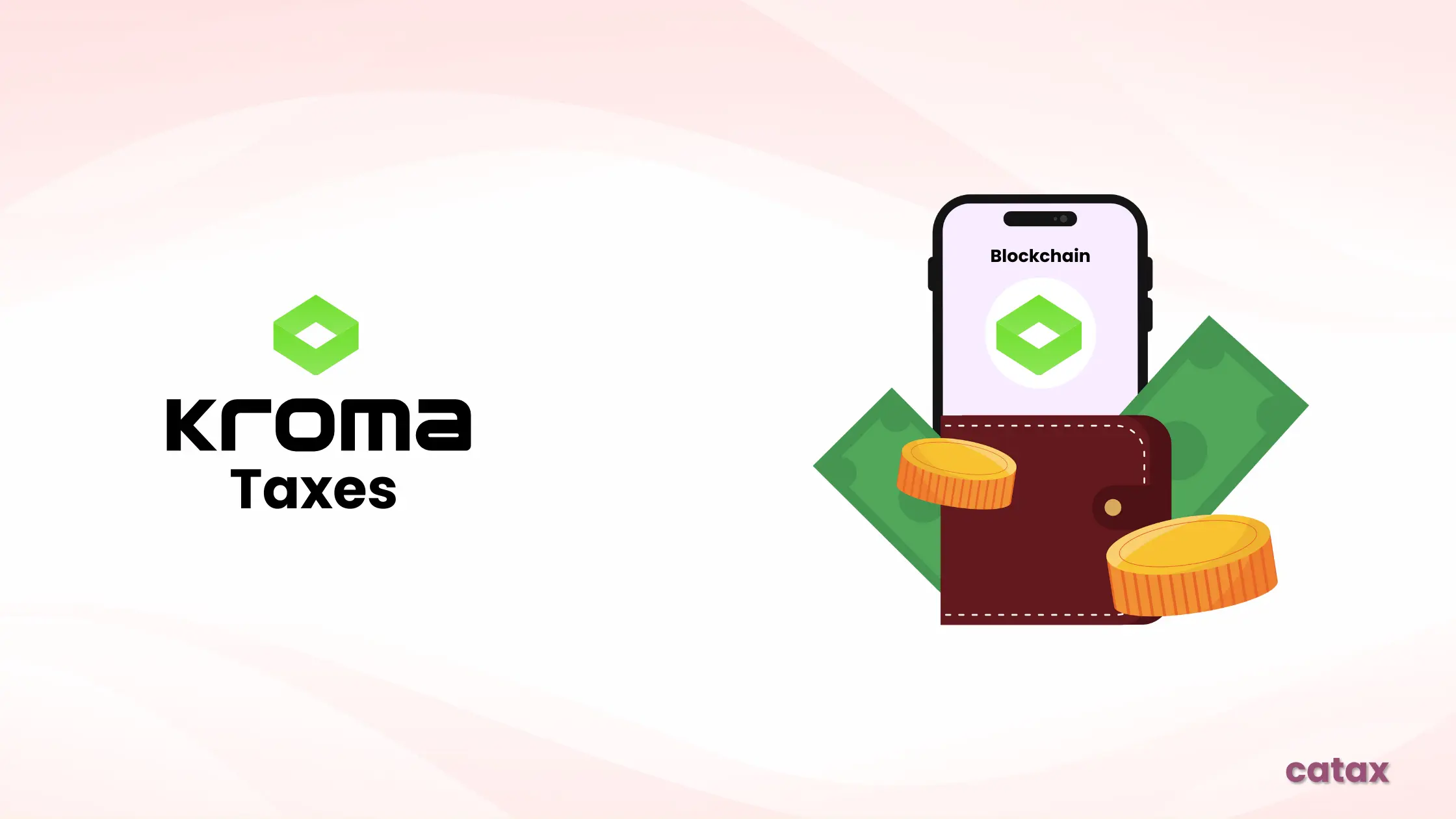Cryptocurrency tax rules can be different in each country, and Kroma transactions may be taxed in different ways depending on where you live. Whether you buy, sell, trade, or stake Kroma, it is important to know how these activities are taxed and what you need to report.
This guide explains Kroma tax rules in simple and clear words so you can stay compliant and avoid any taxes problems.
How to Connect Your Kroma Wallet to Catax
You can easily track your Kroma transactions and calculate your taxes by connecting your wallet to Catax. Follow these simple steps:
- Open your Kroma wallet or use a block explorer like MetaMask, Trust Wallet, Ledger, or any other supported wallet.
- Copy your public wallet address.
On Catax:
- Log in and select your country.
- Choose Chain, then search for Kroma Wallet.
- Paste your wallet address and click Connect.
After connecting, Catax will automatically track your Kroma transactions, making it much easier to calculate your taxes correctly.
Calculate My Taxes ➤Are Kroma Transactions Taxable?
Yes, in most countries, Kroma transactions are taxable. Governments usually treat Kroma as property, income, or capital assets, depending on how you use it.
When Do You Need to Pay Taxes?
You might have to pay taxes when you:
- Sell for a profit – If you sell Kroma for more than you paid, the profit is taxed as a capital gain.
- Trade for another cryptocurrency – If you exchange Kroma for Bitcoin, Ethereum, or any other crypto, it may trigger a taxable event.
- Use for purchases – Spending Kroma to buy goods or services could create a capital gains tax if the value has increased.
- Earn from staking – Many countries tax staking rewards as income at the time you receive them.
- Receive as payment – If you receive Kroma for services or work, it is usually considered taxable income based on its value when received.
Because tax rules are different everywhere, it’s smart to check how your local tax office treats Kroma transactions.
Can You Deduct Trading Fees and Other Costs?
Many Kroma users ask if they can deduct trading fees, transfer fees, or security costs. Whether you can deduct them depends on your country’s tax rules.
Some countries allow deductions for:
- Trading fees paid when buying or selling Kroma.
- Transaction (network) fees for sending Kroma between wallets.
- Security expenses, such as hardware wallets or private key storage.
Other countries only allow you to deduct:
- The cost of acquiring Kroma, meaning the purchase price can be subtracted when you sell but not the extra fees like exchange fees or transfer costs.
It is a good idea to check your country’s tax guidelines before claiming any deductions.
How Is Kroma Taxed Based on Holding Period?
How long you hold Kroma before selling can affect how much tax you pay. Many countries have different rules for short-term and long-term holdings:
- Short-term holdings (less than a year) – These are often taxed at higher rates, similar to regular income tax.
- Long-term holdings (more than a year) – Some countries offer lower tax rates to encourage people to hold cryptocurrencies longer.
- Flat tax rates – A few countries use a fixed tax rate no matter how long you hold your Kroma.
Knowing how your country taxes different holding periods can help you plan your crypto investments better.
You can also check out our Country-Specific Guide for Crypto in Your country. This guide provides insights on regulations, tax implications, and compliance measures breifly explained for each country.
How Is Staking Income Taxed?
If you stake Kroma, the rewards you earn may be taxed too. But different countries have different ways of taxing staking income.
How Different Countries Handle Staking Rewards
- Taxed as income – Some countries treat staking rewards as regular income, meaning you have to pay taxes on the value when you receive them.
- Taxed as capital gains – Other countries only tax staking rewards when you sell or trade them, meaning you pay tax only on the profit.
If you stake Kroma, it is important to know when your tax responsibility begins. Some countries tax you even if you don’t sell your staking rewards. Always check your local tax rules before you start staking.
Can You Claim Kroma Losses for Tax Benefits?
If you sell Kroma at a loss, it could help lower your tax bill. Here’s how some countries treat crypto losses:
How Different Countries Handle Crypto Losses
- Loss offsets – You may be able to use your Kroma losses to reduce your taxable gains, meaning you only pay tax on your final profits.
- Loss carryforward – If you have no profits this year, some countries let you carry forward your losses to reduce future profits.
- Limited deductions – Some countries don’t allow you to deduct crypto losses at all.
Keeping clear records of all your trades and transactions will make it easier to claim any losses when filing your taxes.
How to Stay Compliant with Kroma Tax Rules
It is important to follow tax rules carefully when dealing with crypto like Kroma. To stay safe and avoid penalties:
- Know how your country taxes Kroma – Find out if gains are taxed as capital gains, income, or business profits.
- Check if you can deduct trading fees and other expenses – Rules vary by country.
- Keep good records – Save details for every buy, sell, stake, trade, or spend involving Kroma.
- Use a tax tool like Catax – Catax can track your crypto transactions and make tax filing much easier.
- Get help from a tax professional – If you’re unsure, talking to an expert can help you file your taxes properly.
